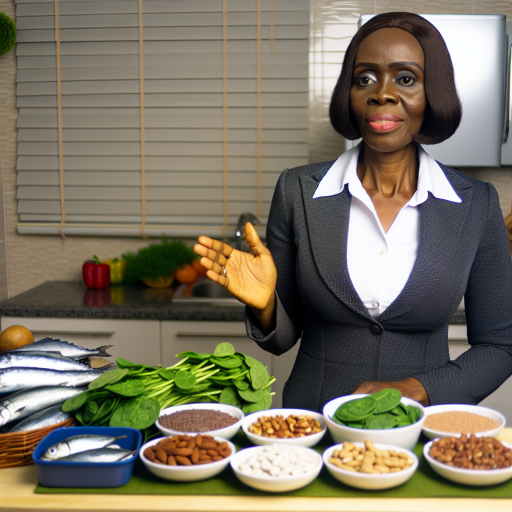Introduction
Minerals play a crucial role in maintaining overall health.
They support various bodily functions, including bone health, muscle function, and immune response.
Essential minerals like calcium, magnesium, iron, and zinc must be included in our diets.
A deficiency in these minerals can lead to serious health issues.
Nigerian cuisine offers a treasure trove of mineral-rich foods.
Many traditional dishes incorporate local ingredients that are packed with essential nutrients.
By exploring Nigerian foods, you can enhance your mineral intake effectively and deliciously.
This post will highlight ten Nigerian foods that supercharge your mineral consumption.
Each food item will be discussed in detail, focusing on its mineral content and health benefits.
You will gain insights into how you can incorporate these foods into your meals.
Get ready to discover tasty options that will boost your health!
Understanding Minerals and Their Benefits
Minerals are essential nutrients that play a key role in our overall health.
They help our bodies function properly and maintain various biological processes.
This section will focus on understanding the key minerals necessary for health and their diverse benefits.
Key Minerals Necessary for Health
- Calcium: Crucial for strong bones and teeth.
- Iron: Essential for oxygen transport in the blood.
- Magnesium: Involved in over 300 biochemical reactions in the body.
- Zinc: Important for immune function and wound healing.
- Potassium: Aids in maintaining healthy blood pressure levels.
- Sodium: Regulates fluid balance in the body.
- Phosphorus: Supports strong bones and teeth as well.
- Selenium: Acts as an antioxidant, helping to protect cells.
- Copper: Plays a role in iron metabolism and cardiovascular health.
- Manganese: Contributes to bone formation and nutrient metabolism.
Roles of Minerals in Bodily Functions
Each mineral serves specific functions in our bodies.
Understanding these roles highlights their importance for maintaining health and wellness.
Bone Health
Calcium and phosphorus are vital for building and maintaining strong bones.
These minerals work together to form the structural component of bones.
Magnesium also plays a supporting role by regulating calcium levels and aiding in bone formation.
A lack of these minerals can lead to conditions like osteoporosis.
Oxygen Transport
Iron is essential for hemoglobin production in red blood cells.
Hemoglobin carries oxygen from the lungs to the rest of the body.
An adequate intake of iron prevents anemia, which can cause fatigue and weakness.
Consuming iron-rich foods is crucial for maintaining energy levels.
Immune Support
Zinc strengthens the immune system by activating T-cells.
These cells are a type of white blood cell that fights off infections.
A deficiency in zinc can impair immune response, leading to a higher risk of illness.
This makes zinc a key player in maintaining our health.
Energy Production
Many minerals, such as magnesium and potassium, play roles in energy metabolism.
Magnesium regulates enzymes involved in energy production, while potassium aids muscle contractions.
A well-functioning mineral balance ensures that the body has the energy to perform daily activities.
Fluid Balance
Sodium and potassium work together to maintain fluid balance in the body.
They regulate blood pressure and ensure cells receive the hydration they need.
An imbalance between these minerals can lead to dehydration or hypertension, demonstrating their importance for overall health.
Antioxidant Defense
Selenium acts as an antioxidant, protecting cells from oxidative stress.
It helps prevent damage from free radicals, which can contribute to chronic diseases.
Adequate selenium intake supports heart health and boosts the immune system.
Metabolism and Nutrition
Copper and manganese play roles in nutrient metabolism.
Copper aids in iron absorption and the formation of connective tissue.
Manganese contributes to the metabolism of carbohydrates and fats.
These functions are essential for maintaining optimal energy levels.
In fact, minerals are vital for various bodily functions.
Each one plays a unique role that impacts our health.
Ensuring a balanced intake of these minerals promotes proper bodily functions, boosts immunity, and supports overall well-being.
By recognizing their benefits, you can make informed dietary choices to supercharge your mineral intake through Nigerian foods.
Understanding the key minerals and their health benefits is essential for making informed dietary choices.
Regularly consuming foods high in these minerals can significantly enhance your health.
This knowledge empowers you to incorporate more mineral-rich Nigerian foods into your diet for a healthier lifestyle.
The Nutrient Density of Nigerian Cuisine
Nigerian cuisine offers a rich tapestry of flavors and nutrients.
It incorporates various ingredients known for their mineral density.
Traditional dishes elegantly combine roots, vegetables, proteins, and grains.
These elements contribute not only to taste but also to the nutritional value.
Let’s delve into the key ingredients that supercharge your mineral intake.
Unlock the Power of Nigerian Food Minerals
Discover personalized Food Advisory tailored to boost your health or business using expert insights on Nigerian minerals.
Get StartedKey Mineral-Rich Ingredients
- Leafy Greens: Vegetables like spinach (efo), bitter leaf (onugbu), and amaranth (uneko) are mineral powerhouses.
They are abundant in calcium and iron, supporting bone health and red blood cell production. - Legumes: Beans, particularly black-eyed peas (ewa), are excellent sources of iron and magnesium.
They help in muscle function and energy production. - Seafood: Fish, especially sardines and catfish, are rich in iodine and omega-3 fatty acids.
These nutrients promote thyroid health and brain function. - Tubers: Yam, cassava, and sweet potatoes are high in potassium and dietary fiber.
They help regulate blood pressure and improve digestive health. - Nuts and Seeds: Groundnuts (peanuts) and pumpkin seeds are dense in zinc and vitamin E.
They support immune function and skin health. - Spices: Ingredients like ginger and garlic improve digestion and enhance mineral absorption.
They bring flavor and health benefits in every meal. - Meat: Goat and chicken provide essential proteins and iron.
They contribute to muscle development and overall vitality. - Fruits: Fruits like bananas and oranges offer potassium and vitamin C.
They assist in hydration and immune system support. - Grains: Whole grains like millet and quinoa are rich in iron and fiber.
They stabilize blood sugar and promote gut health. - Fermented Foods: Ogi and fufu contribute beneficial probiotics.
These help in mineral absorption and gut health.
Meeting Daily Mineral Needs
Many Nigerians rely on a balanced diet to meet their daily mineral needs.
Traditional meals typically satisfy or exceed recommended mineral levels.
Consuming a variety of local foods ensures a comprehensive nutrient intake.
This consumption sets the foundation for optimal wellness.
- Calcium: Leafy greens and fish deliver calcium, essential for strong bones.
Incorporating them helps avoid deficiencies. - Iron: Beans and meat are excellent sources, critical for energy and immunity.
Eating these regularly supports mental clarity and vitality. - Magnesium: Nuts, seeds, and whole grains offer magnesium for muscle health.
They prevent cramps and maintain a calm nervous system. - Zinc: Groundnuts and seafood enhance immune function.
Adequate zinc levels promote healthy skin and speed up recovery from illness. - Iodine: Seafood is the best source of iodine, important for thyroid function.
Including fish in your diet can prevent thyroid diseases. - Potassium: Fruits and tubers provide potassium, crucial for heart health.
Maintaining proper potassium levels lowers blood pressure.
Traditional Dishes to Explore
To experience the mineral benefits of Nigerian cuisine, try these traditional dishes.
They not only satisfy the palate but also deliver essential nutrients.
- Pounded Yam and Egusi Soup: This dish combines yam, rich in potassium, with egusi (melon seeds), high in magnesium and zinc.
- Jollof Rice: A famous party dish often cooked with tomatoes and spices, providing antioxidants, potassium, and essential vitamins.
- Moi Moi: A steamed bean pudding enriched with pepper, onions, and sometimes fish.
It is a fantastic source of protein and iron. - Peppered Fish: Typically made with catfish, it delivers essential omega-3 fatty acids and iron, promoting heart health.
- Bitter Leaf Soup: This dish utilizes bitter leaf, which is high in calcium and iron.
It aids digestion and nutrient absorption. - Yam porridge: A comfort dish made with yam and vegetables, offering potassium, dietary fiber, and various vitamins.
- Okra Soup: This soup, rich in vitamins A and C, also contains magnesium and calcium from the okra and other vegetables used.
- Akara: These bean cakes pack a protein punch and provide iron, making them a nutritious breakfast option.
- Nkwobi: A spicy dish made with cow foot and palm oil, rich in collagen, protein, and essential minerals needed for joint health.
- Peppered Chicken: A popular street food that combines chicken with spices, providing protein, iron, and various B vitamins.
Nigerian cuisine’s richness lies in its nutrient-packed meals.
Traditional dishes provide essential minerals and vitamins.
Incorporating leafy greens and stews into your diet enhances your mineral intake.
Each meal fosters well-being and deepens your appreciation for Nigerian culture.
Enjoying these nutrient-dense foods promotes better health and celebrates tradition.
Embrace Nigerian cuisine today to boost your nutrition while savoring its cultural essence.
Start your journey towards healthier eating!
Read: Nigerian Foods Packed With Essential Minerals You Need
Top 10 Nigerian Foods to Supercharge Your Mineral Intake
1. Egusi Soup
Egusi soup is a staple in many Nigerian homes.
Made from ground melon seeds, it has unique nutritional properties.
It boasts a high magnesium content, essential for muscle function and energy production.
The zinc found in egusi promotes a healthy immune system.
This hearty soup is rich in healthy fats, proteins, and fiber.
It aids in digestion and provides a good balance of macronutrients.
Traditionally, egusi soup serves as a communal dish.
It brings families and communities together, often enjoyed with pounded yam or fufu.
Health-wise, its nutritional profile makes it beneficial for maintaining energy levels.
Moreover, egusi’s antioxidant properties help combat inflammation.
2. Moi Moi
Moi Moi is a delicious steamed bean pudding made from blended black-eyed peas.
This dish is not only tasty but also nutrient-dense.
Rich in protein, it provides essential amino acids necessary for muscle repair and growth.
Additionally, its iron content helps maintain energy levels and prevents anemia.
There are several variations of Moi Moi, including additions of eggs, peppers, and spices.
Each variant can enhance its mineral content dramatically.
Including Moi Moi in your meals can introduce diversity and additional nutrients.
Pair it with rice for a wholesome dish that packs a nutritional punch.
3. Amala (Yam Flour)
Amala, made from yam or plantain flour, is another popular Nigerian dish.
It is particularly recognized for its beneficial mineral content.
Captivate Your Audience with Exclusive Nigerian Food Content
Imagine your platform enriched with unique, mineral-rich Nigerian cuisine stories that no one else can offer. Let's create content that resonates deeply and sets you apart.
Get StartedThis dish is a great source of potassium, which is crucial for heart health and muscle function.
Additionally, its calcium levels contribute to bone strength.
Preparing Amala involves boiling water, then mixing the flour until smooth and thick.
Many enjoy it with soups like ewedu or gbegiri for a delightful combination.
Traditional pairings include a variety of soups, making it a versatile side.
Amala’s subtle flavor enhances the overall meal experience.
4. Ogbono Soup
Ogbono soup is made from wild mango seeds, rich in essential minerals.
This nutrient-dense soup features a thick and creamy texture.
The health benefits of wild mango seeds include high fiber content, promoting digestive health.
Additionally, they are rich in calcium and magnesium, which are vital for overall well-being.
Recipes can vary, often incorporating meats and leafy vegetables for added nutrition.
Serving suggestions include pairing the soup with pounded yam or rice.
Ogbono is more than just food; it’s part of Nigerian heritage and culture.
Consuming it connects you to traditional practices and flavors.
5. Efo Riro (Vegetable Soup)
Efo Riro is a colorful Nigerian vegetable soup packed with iron.
Leafy greens like spinach or kale are the primary ingredients.
These vegetables provide a significant amount of iron, essential for transporting oxygen in the blood.
Combining Efo Riro with protein sources can maximize iron absorption.
To enhance the nutrient absorption, consider adding foods high in vitamin C.
Enjoy Efo Riro with amala, rice, or fufu for a complete meal.
The vibrant colors and savory flavors make this dish a favorite.
Moreover, its health benefits contribute to a balanced and nutritious diet.
6. Akara (Bean Cakes)
Akara are deep-fried bean cakes made from black-eyed peas.
They are high in protein, providing energy and promoting muscle health.
Additionally, Akara offers a rich iron content, supporting red blood cell formation.
This makes it a perfect snack for those needing a nutritional boost.
Variations of Akara can include additional ingredients like onions and spices.
These additions can enhance both flavor and nutritional value.
Akara are enjoyed as a breakfast item or snack throughout the day.
Pair them with pap or custard for a delightful meal experience.
7. Nigerian Pepper Soup
Nigerian Pepper Soup is a spicy soup made with assorted meats or fish.
It is often enriched with spices known for their mineral properties.
Spices like peppers contain magnesium, vital for nerve and muscle function.
This dish also promotes digestion and can aid in detoxification.
Health benefits of consuming Pepper Soup include relief from cold symptoms and improved metabolism.
Enhancing flavors with local spices adds to its uniqueness.
Serving this soup warm is traditional, especially during gatherings.
Its cultural significance also adds to its appeal beyond merely a culinary dish.
8. Pounded Yam and Ewedu (Jute Leaves)
Pounded yam served with ewedu creates a nutrient-dense meal.
Also, pounded yam provides carbohydrates, while ewedu adds vital vitamins and minerals.
The mineral balance helps maintain energy levels and overall health.
Ewedu is particularly rich in vitamins A and C, which support immune function.
This traditional combination is often served with soup or stews.
It highlights the nutritional philosophy of Nigerian cuisine.
Enjoying Pounded Yam with Ewedu connects people to their roots and culture.
The dish remains a favorite for family gatherings and celebrations.
9. Suya (Spicy Meat Skewers)
Suya is a popular street food made from grilled meat.
It’s seasoned with a variety of spices that enhance its flavor and nutritional profile.
The meat provides essential minerals, including zinc and iron, vital for various bodily functions.
Spices used in seasoning also contain beneficial properties that aid in digestion.
When preparing Suya, consider lean cuts of meat for a healthier option.
The spices not only add flavor but also help in mineral absorption.
Suya can be enjoyed as a snack or main dish, often paired with onions and tomatoes.
It offers a festive culinary experience that is uniquely Nigerian.
10. Palm Oil
Palm oil is a staple in many Nigerian cuisines.
It is rich in vitamins A and E, which are crucial for various bodily functions.
These vitamins help in absorbing minerals effectively, promoting overall health.
Its antioxidant properties also support heart health and reduce inflammation.
Palm oil is used in numerous traditional dishes, from stews to soups.
Its distinctive flavor enhances the taste and nutritional value of meals.
By incorporating palm oil into your diet, you support local agriculture and sustainability. Its role in traditional Nigerian cooking makes it a beloved ingredient.
Read: Beverages in Nigeria: Which Ones Offer Rich Minerals?

Incorporating These Foods into Your Diet
Integrating mineral-rich Nigerian foods into your daily meals is simple and rewarding.
These foods enhance your nutrient intake while adding flavor to your dishes.
Here are some practical tips to help you include these foods seamlessly:
Meal Planning
- Begin by planning your weekly meals.
- Incorporate at least one mineral-rich Nigerian food into each meal.
- Ensure variety for a broader nutrient spectrum and to keep meals exciting.
Creative Pairings
Combine Nigerian foods with other ingredients you enjoy.
Here are some delicious pairings:
- Pair beans with rice for protein and fiber.
- Mix egusi soup with spinach or kale for extra vitamins.
- Add fresh vegetables to jollof rice for improved nutrient density.
Snack Options
Incorporate Nigerian foods into your snacking routine.
Healthy snacks can keep your energy levels stable:
- Prepare suya skewers or spicy roasted nuts for protein-rich snacks.
- Enjoy spicy plantain chips or puff-puff for a delicious treat.
- Opt for akara (bean cakes) as a filling mid-morning snack.
Breakfast Boost
Start your day with mineral-rich breakfasts.
A hearty breakfast fuels your body:
- Try maize porridge made with fresh milk and nuts.
- Enjoy a savory bean cake sandwich with vegetables.
- Make oatmeal with local fruits and sweeten it naturally.
Vegan and Vegetarian Options
Vegetarian diets can still be mineral-rich.
Here are Nigerian foods that fit a plant-based lifestyle:
- Incorporate legumes like lentils and chickpeas in your meals.
- Enjoy vegetables like ugu and spinach for iron and calcium.
- Use coconut milk as a dairy alternative in soups and stews.
Adapt to Dietary Restrictions
Not everyone can consume specific foods due to allergies or intolerances.
Here are some adjustments you can make:
- For gluten sensitivity, choose rice or yam instead of wheat-based dishes.
- Replace fish in certain recipes with tofu for a plant-based protein source.
- Use vegetable broth instead of meat-based broth in soups.
Experiment with Cooking Methods
Diverse cooking methods can enhance flavor and retain nutrients.
Try different techniques for variety:
- Steaming vegetables preserves more nutrients than boiling.
- Grilling or roasting brings out the natural flavors of foods.
- Try sautéing with minimal oil to promote healthy eating.
Create a Flavorful Spice Rack
Spices can enhance the taste of your meals.
Consider these spices for Nigerian cuisines:
- Use ginger and garlic for an aromatic foundation in dishes.
- Add pepper for heat and flavor, enhancing minerals’ absorption.
- Utilize curry powder for a unique twist on traditional recipes.
Join Cooking Classes
Engaging in cooking classes can deepen your understanding of Nigerian cuisine.
Learning can inspire creativity:
- Choose classes focusing on traditional Nigerian dishes.
- Explore classes that cater to specific dietary needs.
- Connect with others who share similar food interests.
Share Cooking Experiences
Include family and friends in your cooking adventures.
Sharing meals fosters connection:
- Host themed dinners focused on mineral-rich foods.
- Encourage others to join the cooking process for teamwork.
- Discuss health benefits to raise awareness about nutrition.
Incorporating these delicious Nigerian foods into your diet is enjoyable and beneficial.
With intentional planning, creativity, and exploration, you can boost your mineral intake significantly.
Remember to embrace flexibility in your dietary preferences and make adjustments as necessary.
Your body will thank you for the abundance of nutrients, enhancing your overall health and vitality.
Read: Mineral Powerhouses: Local Nigerian Ingredients to Know
Minerals and Cooking Methods
Understanding the Impact of Cooking Methods on Mineral Levels
Cooking methods can significantly impact the mineral content of foods.
Different techniques can either enhance or diminish the minerals present in our meals.
Understanding these methods allows you to maximize nutrient retention in what you consume.
Below, we will explore various cooking methods and how they influence mineral levels.
Boiling
Boiling is a common cooking method that involves submerging food in water.
While this technique can enhance flavor, it can also leach out soluble minerals.
Here’s how boiling affects minerals:
- Water-soluble minerals, such as potassium and magnesium, dissolve into the boiling water.
- Long boiling times increase the loss of nutrients.
- Vegetables often lose up to 50% of their minerals through boiling.
Steaming
Steaming preserves more nutrients than boiling.
This method uses steam to cook food without submerging it in water.
Here are the main benefits of steaming:
- Minerals stay intact because there’s no contact with water.
- Cooking times are generally shorter, retaining more nutrients.
- Steamed vegetables maintain their vibrant colors and textures.
Roasting and Baking
Roasting and baking use dry heat to cook food, which can affect minerals differently.
Here’s how these methods impact nutrients:
- Dry heat can lead to minor losses of water-soluble vitamins, but minerals remain largely unaffected.
- Caramelization during roasting can impart additional flavors without depleting minerals.
- Roasting vegetables intensifies their flavors, making them more palatable.
Frying
Frying involves cooking food in oil.
This method can also influence the mineral content.
Consider these points when frying:
- Frying can degrade heat-sensitive vitamins, but minerals often remain stable.
- Using healthier oils can help retain nutrients while enhancing flavor.
- Quick frying methods minimize nutrient loss compared to longer frying durations.
Grilling
Grilling exposes food to direct heat.
This method can also impact the nutrient content. Here’s what to consider:
- Grilling does not require water, which helps retain minerals.
- Quick cooking times prevent lengthy exposure to heat, protecting nutrients.
- Charring can create harmful compounds, so moderation is essential.
Microwaving
Microwaving is a quick and convenient method of cooking.
This technique, though relatively new, shows promising nutrient retention.
Here’s how microwaving fares regarding minerals:
- Microwaving preserves nutrients effectively due to shorter cooking times.
- Water requirements are minimal, reducing the risk of mineral loss.
- Food cooks quickly, minimizing exposure to high temperatures.
Tips for Retaining Minerals During Preparation and Cooking
Now that you understand the impact of different cooking methods, let’s explore practical tips to retain minerals during food preparation and cooking:
- Use minimal water: Whenever possible, avoid excess water during cooking.
- Shorten cooking time: Keep cooking durations short to preserve more nutrients.
- Avoid peeling: For many vegetables, skins are nutrient-rich. Cook with the skin on when possible.
- Cut larger pieces: Cooking whole or larger pieces minimizes surface area and nutrient loss.
- Cover your pots: Using a lid when cooking can reduce cooking time and conserve heat.
- Opt for quick cooking methods: Consider steaming, microwaving, or stir-frying for minimal nutrient loss.
- Don’t soak vegetables: Soaking vegetables before cooking can leach out soluble minerals.
- Include cooking water in dishes: Use the water from boiling or steaming in soups or sauces to retain dissolved minerals.
- Store food optimally: Proper storage can prevent nutrient degradation before cooking.
- Avoid reheating multiple times: Repeated reheating can deplete nutrients. Cook only what you’ll eat.
By understanding the impact of various cooking methods and applying these tips, you can significantly enhance the mineral content of your meals.
Eating foods rich in minerals is essential for maintaining good health.
Prioritizing nutrient retention while cooking will ensure you derive maximum benefits from your Nigerian foods.
In a nutshell, each cooking method affects mineral levels in unique ways.
Being mindful of these effects allows you to make informed cooking choices.
Embracing the tips above will help you retain those essential nutrients, boosting your overall mineral intake significantly.
As you prepare and enjoy traditional Nigerian meals, remember that the way you cook can make all the difference.
Read: 10 Common Nigerian Foods That Are Surprisingly Rich in Calcium
Conclusion
Minerals play a critical role in maintaining overall health.
They support various bodily functions, including bone health, nerve signaling, and immune function.
Incorporating mineral-rich foods into your diet can significantly enhance your well-being.
Nigerian cuisine offers a variety of nutrient-dense options that can boost your mineral intake.
By exploring traditional Nigerian foods, you can enjoy delicious meals while nourishing your body.
Foods like spinach, beans, and fish are rich in vital minerals.
They provide essential nutrients that support a vibrant lifestyle.
Dishes such as egusi soup and moi moi offer not only flavor but also significant health benefits.
We encourage you to experiment with these foods in your daily meals.
Embrace the vibrant flavors and nutritional power of Nigerian dishes.
Whether you’re preparing a spicy pepper soup or a hearty jollof rice, consider adding mineral-rich ingredients.
These enhancements can make a noticeable difference in your health.
We’d love to hear from you! Share your favorite mineral-rich Nigerian dishes or recipes in the comments.
Your experiences may inspire others to try new foods that promote health and vitality.
Together, let’s celebrate the rich culinary tradition of Nigeria and its benefits to our health.




